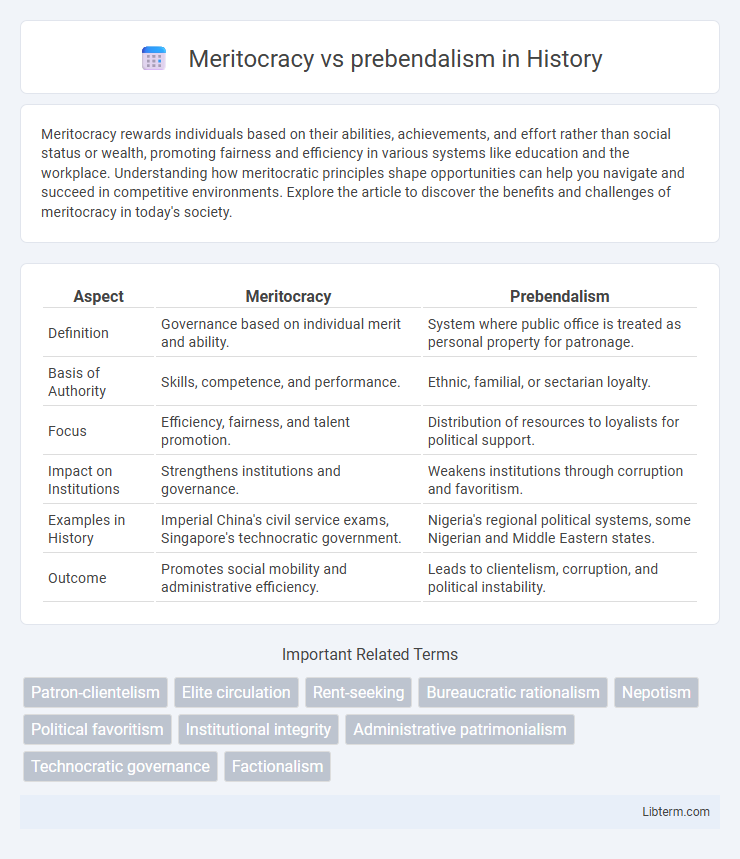Meritocracy rewards individuals based on their abilities, achievements, and effort rather than social status or wealth, promoting fairness and efficiency in various systems like education and the workplace. Understanding how meritocratic principles shape opportunities can help you navigate and succeed in competitive environments. Explore the article to discover the benefits and challenges of meritocracy in today's society.
Table of Comparison
| Aspect | Meritocracy | Prebendalism |
|---|---|---|
| Definition | Governance based on individual merit and ability. | System where public office is treated as personal property for patronage. |
| Basis of Authority | Skills, competence, and performance. | Ethnic, familial, or sectarian loyalty. |
| Focus | Efficiency, fairness, and talent promotion. | Distribution of resources to loyalists for political support. |
| Impact on Institutions | Strengthens institutions and governance. | Weakens institutions through corruption and favoritism. |
| Examples in History | Imperial China's civil service exams, Singapore's technocratic government. | Nigeria's regional political systems, some Nigerian and Middle Eastern states. |
| Outcome | Promotes social mobility and administrative efficiency. | Leads to clientelism, corruption, and political instability. |
Understanding Meritocracy: Principles and Practice
Meritocracy emphasizes advancement based on individual talent, effort, and achievements, promoting fairness and efficiency in organizational and governmental systems. Its principles include equal opportunity, performance-based rewards, and the cultivation of skills through education and training. In practice, meritocracy seeks to minimize favoritism and nepotism by ensuring positions and resources are allocated according to merit rather than social connections or political influence.
Defining Prebendalism: Origins and Characteristics
Prebendalism is a political system where public offices and resources are treated as personal entitlements by officeholders, often rooted in patrimonial traditions and patron-client relationships. Its origins trace back to colonial and traditional governance structures where state positions served as sources of personal wealth and loyalty rather than merit or institutional rules. Key characteristics include patronage networks, corruption, and the allocation of government benefits based on ethnicity or kinship rather than competence or qualifications.
Historical Development of Meritocracy and Prebendalism
Meritocracy emerged prominently during the Enlightenment era, emphasizing individual talent and achievement as the basis for social and political advancement, contrasting sharply with hereditary privileges. Prebendalism traces its roots to traditional societies where political offices and resources are treated as personal entitlements tied to ethnic, kinship, or regional groups, often institutionalized during colonial administrations to maintain control. The historical development of meritocracy reflects the rise of bureaucratic states and rational-legal authority, while prebendalism persists in many post-colonial states, undermining formal institutions by prioritizing patronage and communal loyalties.
Key Differences Between Meritocracy and Prebendalism
Meritocracy prioritizes individuals' skills, talents, and achievements as the basis for leadership and resource distribution, promoting efficiency and innovation in governance. Prebendalism involves the allocation of public offices and resources based on loyalty, ethnicity, or personal connections, often leading to corruption and patronage networks. The key difference lies in meritocracy's emphasis on objective performance metrics, whereas prebendalism relies on subjective relational ties and favoritism.
Impacts of Meritocracy on Governance and Society
Meritocracy enhances governance efficiency by promoting qualified leaders based on skills and achievements, which reduces corruption and patronage in public institutions. It drives social mobility and economic growth by incentivizing education and innovation, fostering a competitive and accountable workforce. Societally, meritocracy tends to reduce nepotism and prebendalism by prioritizing competence over personal connections, leading to fairer resource distribution and improved public trust.
Effects of Prebendalism on Political and Economic Systems
Prebendalism undermines meritocracy by promoting political patronage and favoritism, leading to inefficiencies in governance and resource allocation. This system fosters corruption and rent-seeking behavior, weakening institutional quality and hindering economic development. Consequently, prebendal political structures erode public trust and obstruct social mobility, impeding long-term sustainable growth.
Case Studies: Countries Exemplifying Meritocracy
Singapore and South Korea represent prime case studies exemplifying meritocracy driven by robust educational systems and transparent governance structures that reward talent and competence. These countries showcase how merit-based recruitment in public sectors fosters economic growth, reduces corruption, and promotes social mobility by prioritizing ability over patronage. Their sustained investments in human capital and institutional reforms highlight a direct correlation between meritocratic principles and national development outcomes.
Case Studies: Societies Influenced by Prebendalism
Societies influenced by prebendalism, such as Nigeria and Indonesia, exhibit governance systems where public offices are viewed as personal fiefdoms for distributing resources to loyalists rather than based on meritocratic principles. This leads to entrenched patron-client networks that undermine institutional efficiency and accountability, contrasting sharply with meritocratic frameworks that prioritize competence and performance. The entrenchment of prebendalism fosters corruption and hinders socioeconomic development by prioritizing personal loyalty over public interest.
Challenges in Transitioning from Prebendalism to Meritocracy
Transitioning from prebendalism to meritocracy faces significant challenges such as entrenched patronage networks, where public officials prioritize personal or group interests over institutional goals. Weak rule of law and lack of accountability mechanisms hinder efforts to implement merit-based recruitment and promotion in public administration. Overcoming societal resistance to change and rebuilding trust in impartial governance structures are essential for achieving sustainable meritocratic systems.
Future Prospects: Building Transparent and Accountable Systems
Future prospects for meritocracy emphasize the development of transparent recruitment processes, objective performance evaluations, and data-driven decision-making that reduce bias and promote accountability. In contrast, overcoming prebendalism requires comprehensive reforms to dismantle entrenched patronage networks and implement stringent anti-corruption measures aimed at fostering equitable resource distribution. Leveraging digital governance platforms and open data initiatives can enhance transparency and citizen participation, forming the foundation for sustainable institutional integrity and public trust.
Meritocracy Infographic

 libterm.com
libterm.com